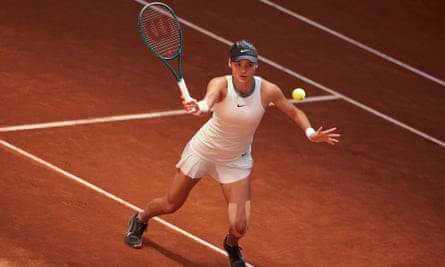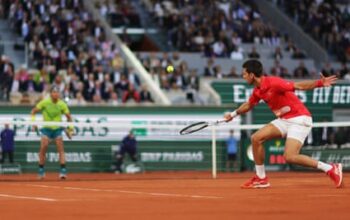For a few fleeting moments at the beginning of the clay court season, Emma Raducanu provided a firm reminder of the talent at her grasp. As Great Britain upset France on their own favoured surface, Raducanu played a starring role with two strong wins. Even more impressive than the victories was the level she exhibited throughout, which was some of the best tennis she has played. Two and a half years on from her US Open triumph, this was meaningful progress to build on.
After her opening win there over Caroline Garcia, a former world No 4, Raducanu made an interesting statement. Asked a standard question about the impact of the win on her confidence, she asserted that her belief was built on the practice court, not in matches. Dedicating significant time to training remained a priority.
“I wouldn’t say that it’s confidence building or make or break in terms of the results because I’ve been taking so much confidence just from the practice I’m doing,” she said. “I think you can gain confidence two ways, by winning matches or by practising very well. I’ve been practising really well even though I’m technically lighter on matches. But that’s the way I like doing things right now and probably more going forwards.”
It is fair to say that Raducanu continues to faithfully follow the ethos of devoting significant time to her training even if it means fewer matches. The 21-year-old followed up her success at the Billie Jean King Cup with a strong quarter-final run in Stuttgart, but since her 6-2, 6-2 loss to María Lourdes Carlé in the opening round of Madrid on 24 April, where she complained of mental and physical exhaustion after two weeks on the road, Raducanu has not competed at all.
On Sunday, Raducanu extended her absence for likely another three weeks by withdrawing from the French Open. Rather than any injuries or niggles, Raducanu says that she simply intends to undertake a training block to protect her physically. “It’s important for me to keep laying on the foundations, and I will use the time to do a healthy block before the grass and subsequent hard-court seasons to give myself a chance to keep fit for the rest of the year,” she said.
While an extremely unconventional decision, there is logic in Raducanu taking her time, not feeling pressured to play too much and ensuring that her body is robust enough for the many years ahead. Still, it is hard not to wonder if she would be making these decisions if she was able to compete in the main draw of the tournaments in the second half of the clay season.

In the difficult 18 months after her US Open triumph, Raducanu frequently pointed out that she skipped so many steps in her development by winning a grand slam tournament at 18 before she had even won a WTA tour match. Her layoff last year after three surgeries, though, actually provided an opportunity to address some of those gaps in her progression. It seemed like it could have been helpful for her to compete in some lower-level tournaments, where she could build her match fitness, durability, and essentially piece together wins.
Instead, so far this year Raducanu has received a wildcard in six of her seven tournaments played. She has also chosen to compete almost exclusively in the big events; her first tournament of the season, a wildcard appearance in Auckland, remains the only time she has even competed in a WTA 250 event this year.
After the Italian and French Opens opted to prioritise local players with their wildcards, Raducanu was left with the choice of participating in one of the numerous WTA 125 tournaments taking place in recent weeks, the ITF circuit and the Roland Garros qualifying draw or bowing out until the tour arrives at her doorstep during the grass season. While even veteran champions like Andy Murray and Stan Wawrinka have willingly dropped down to second-tier events in order to gain more match practice in recent weeks, Raducanu opted against doing so.
after newsletter promotion
Raducanu’s scheduling choices this year seem to reflect her self-belief and how she sees herself among the best players in the world. It is impressive; that inner belief is clearly a reason why she is a grand slam champion. But so far on the WTA tour, she has won three matches in a tournament just four times. The line between admirable self-confidence and hubris is thin.
Playing tennis matches is an elementary part of being a top professional tennis player. They build rhythm, confidence, match fitness and sharpness in the toughest moments. Since Raducanu’s last encounter in Madrid, for comparison, Iga Swiatek has played 12 matches and nearly every choice she has made over the past four weeks, as she clinched the Madrid-Rome double, was in service of winning.
This summer, it remains to be seen if she can indeed claw her way back up the rankings while developing as a player if she is competing so infrequently and only interested in doing so against the best in the world.


